DETERMINE WHETHER THE RELATION REPRESENTS A FUNCTION
Subscribe to our ▶️ YouTube channel 🔴 for the latest videos, updates, and tips.
From the given relation, List out input and output values
Every input must have only one output, then it is a function. We can check this using arrow diagram.
Which of the following sets of ordered pairs are functions ? Give reasons for your answers.
1) (1, 1), (2, 2), (3, 3), (4, 4)
2) (-1, 2), (-3, 2), (3, 2), (1, 2)
3) (2, 5), (-1, 4), (-3, 7), (2, -3)
4) (3, -2), (3, 0), (3, 2), (3, 4)
5) (-7, 0), (-5, 0), (-3, 0), (-1, 0)
6) (0, 5), (0, 1), (2, 1), (2, -5)
Problem 1 :
(1, 1), (2, 2), (3, 3), (4, 4)
Solution :
Let X be the set of inputs and Y be the set of outputs.
Inputs (x) = {1, 2, 3, 4}
Outputs (y) = {1, 2, 3, 4}
Create a mapping of the following relation,
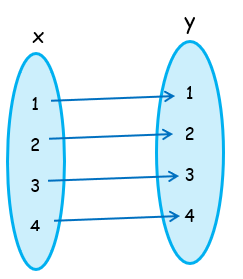
Form the arrow diagram, we understand that each x-value is being paired with only one y-value.
Or simply each input has at most one output. So, it is a function.
Problem 2 :
(-1, 2), (-3, 2), (3, 2), (1, 2)
Solution :
Let X be the set of inputs and Y be the set of outputs.
Inputs (x) = {-1, -3, 3, 1}
Output (y) = {2}
Create a mapping of the following relation,
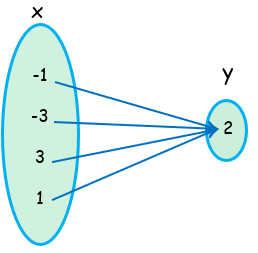
Because input has atmost only one output. So, it is a function.
Problem 3 :
(2, 5), (-1, 4), (-3, 7), (2, -3)
Solution :
Let X be the set of inputs and Y be the set of outputs.
Inputs (X) = {2, -1, -3, 2}
Output (Y) = {5, 4, 7, -3}
Create a mapping of the following relation,
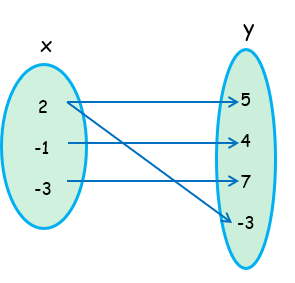
By observing the arrow diagram, one of the input has more than one output. So, it is not a function.
Problem 4 :
(3, -2), (3, 0), (3, 2), (3, 4)
Solution :
Let X be the set of inputs and Y be the set of outputs.
Inputs (x) = {3}
Outputs (S) = {-2, 0, 2, 4}
Create a mapping of the following relation,
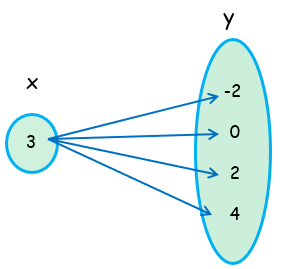
The input 3 has associate with more than one output. So, it is not a function.
Problem 5 :
(-7, 0), (-5, 0), (-3, 0), (-1, 0)
Solution :
Let X be the set of inputs and Y be the set of outputs.
The set of x = {-7, -5, -3, -1}
The set of y = {0}
Create a mapping of the following relation,
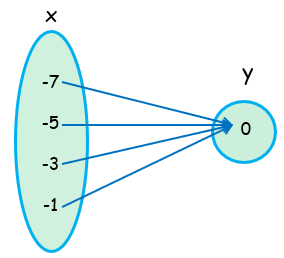
Each input is associated with only one output, but no input is having more than one output. So it is a function.
Problem 6 :
(0, 5), (0, 1), (2, 1), (2, -5)
Solution :
Let X be the set of inputs and Y be the set of outputs.
Inputs(x) = {0, 2}
Outputs (Y) = {5, 1, -5}
Create a mapping of the following relation,
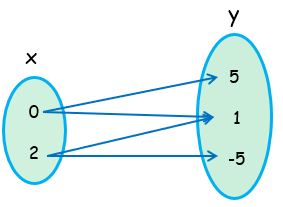
Since the inputs 0 and 2 are having more than one output, it is not a function.
Problem 7 :
Find the range of f (x) = −x + 4 for the domain {–3, –2, –1, 1}
Solution :
f(x) = -x + 4
|
When x = -3 f(-3) = -(-3) + 4 = 3 + 4 = 7 |
When x = -2 f(-2) = -(-2) + 4 = 2 + 4 = 6 |
|
When x = -1 f(-1) = -(-1) + 4 = 1 + 4 = 5 |
When x = 1 f(1) = -1 + 4 = 3 |
So, the range is {7, 6, 5, 3}.
Problem 8 :
An employee receives a weekly salary of $340 and a 6% commission on all sales.
a. Write a rule to describe the function f(d) that gives weekly earnings in terms of d dollars in sales.
b. Find the employee’s earnings for a week with $660 total sales.
c. What were the employee’s total sales for a week in which her earnings were $1300?
Solution :
Let x be the total sales.
a)
f(d) = 340 + 6% of total sales
= 340 + 6% of x
f(d) = 340 + 0.06x
So, the required function is f(d) = 340 + 0.06x.
b) Total sales = 660
f(660) = 340 + 0.06(660)
= 340 + 39.6
= 379.6
c) When total earning = 1300
f(x) = 340 + 0.06x
1300 = 340 + 0.06x
1300 - 340 = 0.06x
960 = 0.06x
x = 960/0.06
x = 16000
So, the required total sales is 16000.
Problem 9 :
Use the vertical line test to determine whether the relation is a function.
(−1, −2), (3, −1), (−5, 2) (−3, −5)
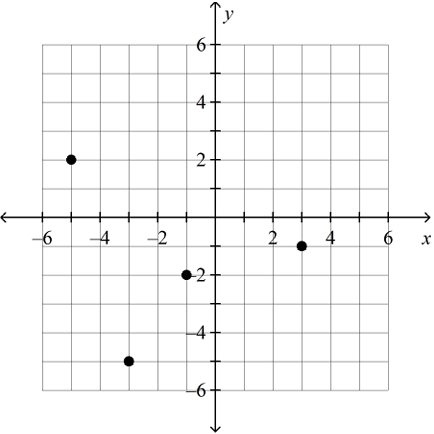
Solution :
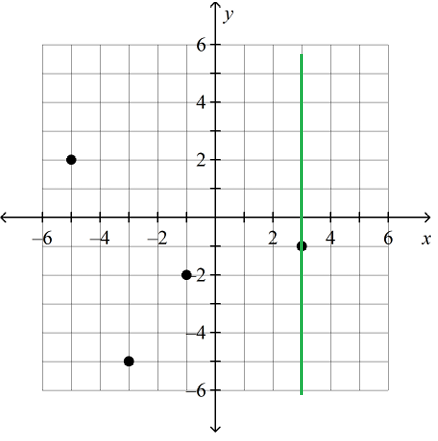
When we draw the vertical line, it is intersecting the points maximum at one point. So, this relation is function.
Problem 9 :
You are driving to visit a friend in another state who lives 440 miles away. You are driving 55 miles per hour and have already driven 275 miles. Write and solve an equation to find how much longer in hours you must drive to reach your destination.
Solution :
Total distance to be covered = 440 miles
Number of miles per hour = 55
Number of miles driven = 440 - 55x
270 = 440 - 55x
270 - 440 = -55x
-170 = -55x
x = 170/55
x = 3.09
Approximately 3 miles.
Problem 10 :
A customer went to a garden shop and bought some potting soil for $17.50 and 4 shrubs. The total bill was $53.50. Write and solve an equation to find the price of each shrub.
Solution :
Price of each shrub = x
4x + 17.50 = 53.50
4x = 53.50 - 17.50
4x = 36
x = 36/4
x = 9
So, the price of each shrub is $9.
Subscribe to our ▶️ YouTube channel 🔴 for the latest videos, updates, and tips.
Kindly mail your feedback to v4formath@gmail.com
We always appreciate your feedback.
About Us | Contact Us | Privacy Policy
©All rights reserved. onlinemath4all.com

Recent Articles
-
SAT Math Problems and Solutions
Feb 14, 26 06:05 AM
SAT Math Problems and Solutions -
SAT Math Practice Questions with Answers
Feb 14, 26 05:47 AM
SAT Math Practice Questions with Answers -
SAT Math Practice Test with Answers
Feb 14, 26 02:30 AM
SAT Math Practice Test with Answers

